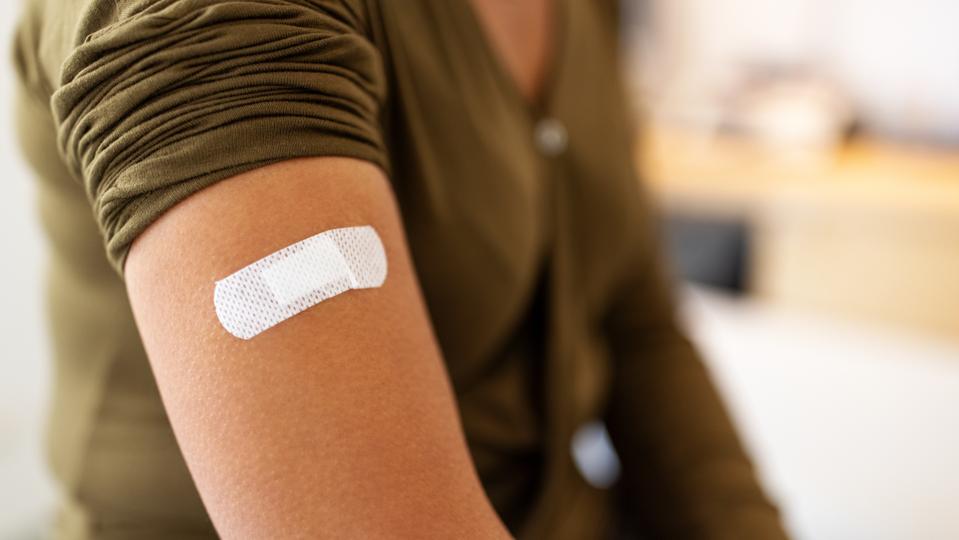South Africa Abandons Oxford-AstraZeneca Covid-19 Vaccine In Favor Of Unapproved Johnson & Johnson Shot
Topline
South Africa has dropped plans to roll out the Oxford-AstraZeneca Covid-19 vaccine after a new analysis suggests the shot provides “minimal protection” against mild disease from the new variant circulating in the country—the country will possibly sell the doses and instead distribute the unauthorized Johnson & Johnson vaccine to frontline healthcare workers, a move that runs counter to advice from experts who believe the shot is still of value in preventing severe disease.

South Africa is ditching its plans to use AstraZeneca’s vaccine
getty
Key Facts
Health Minister Zweli Mkhize said South Africa had abandoned plans to use the Oxford-AstraZeneca vaccine as it “does not prevent mild to moderate disease” caused by the variant circulating in the country.
The rollout was first suspended Sunday after a small study that had not undergone peer review and did not evaluate the vaccine’s protection against severe disease, a key metric of success, suggested it provided “minimal protection” against mild disease from the variant.
Instead, Mkhize said South Africa might sell or swap its 1.5 million Oxford-AstraZeneca shots—something he said has been discussed with the Covax alliance for equitable vaccine distribution worldwide, through which South Africa has acquired some of its shots—and deploy the Johnson & Johnson single-shot vaccine to frontline healthcare workers.
The World Health Organization, along with the study’s lead author and a number of other health organizations, has urged South Africa not to dismiss the Oxford-AstraZeneca shot too soon, stressing its ability to help prevent severe cases of the disease.
Though the Johnson & Johnson vaccine has not been authorized for use in any country yet, Mkhize said it is safe and was in the process of being approved in South Africa and would be initially distributed as part of an “implementation study.”
“The Johnson & Johnson vaccine has been proven effective against the 501Y.V2 variant and the necessary approval processes for use in South Africa are underway,” Mkhize said.
Chief Critic
Shabir Madhi, lead investigator of the study prompting the policy change and a professor at the University of the Witwatersrand in Johannesburg, urged the country not to be “reckless” in how it deals with the Oxford-AstraZeneca shot. “It’s going to have global repercussions,” he added. “The toss-up is going to be between no vaccine or a vaccine that’s got a high likelihood of preventing severe disease and death,” he said.
Tangent
A new study has found that the Oxford-AstraZeneca vaccine could lead to a significant drop in the spread of Covid-19 in the U.K.. As well as slowing the spread of the virus, scientists found a single dose of AstraZeneca’s Covid-19 vaccine is 76% effective in preventing symptomatic infection after three months of receiving the shot, a finding that validates the U.K. government’s current approach of delaying the second dose.
Key Background
The emergence of new Covid-19 variants capable of evading, at least partially, the protection conferred by vaccines is another indication the novel coronavirus could be a permanent fixture in the future. World Health Organization chief Tedros Adhanom Ghebreyesus said Monday that South Africa’s decision is “a reminder that we need to do everything we can to reduce circulation of the virus with proven public health measures” and that vaccine manufacturers will need to adjust their vaccines going forward. Several, Oxford-AstraZeneca included, are already developing booster shots to account for the new variants.
What To Watch For
Other countries in the region may follow South Africa’s lead in swapping the Oxford-AstraZeneca vaccine for something else. On Tuesday, the health minister for neighboring eSwatini said it would no longer use the vaccine.
Further Reading
South Africa scraps AstraZeneca vaccine, will give J&J jabs (AP)
Why South Africa Is Putting The AstraZeneca Vaccine On Hold (NPR)
South Africa says selling or swapping AstraZeneca doses are options (Reuters)
